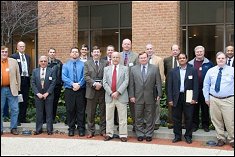 |

|
 |
Attendees at the Symposium on Cooperative Research on Traumatic Brain Injury |
|
On December 4, 2009, the Center for Energetic Concepts Development (CECD) held the First Symposium on Cooperative Research on Traumatic Brain Injury at the UMUC Inn and Conference Center. Participants included researchers from CECD, University of Maryland Medical School in Baltimore, NSWC Indian Head and ETC. The research was jump-started with $75,000 from a collaborative seed grant program between the University of Maryland and the University of Maryland School of Medicine. An additional $1 million comes from the Office of Naval Research and the Naval Surface Warfare Center, Indian Head Division, with other significant federal funding expected in the near future.
Brain trauma is the signature injury of the Iraq and Afghanistan wars, resulting in death or severe permanent brain injury to several thousand warfighters and long-term neuropsychologic problems associated with mild traumatic brain injury to many thousand additional troops. The most common cause of these catastrophic injuries is exposure to blasts, particularly those associated with improvised explosive devices.
For more on this story, please visit the January 2010 issue of Between the Columns, "Protecting Troops From Combat-Related Brain Injuries."
January 19, 2010
|

